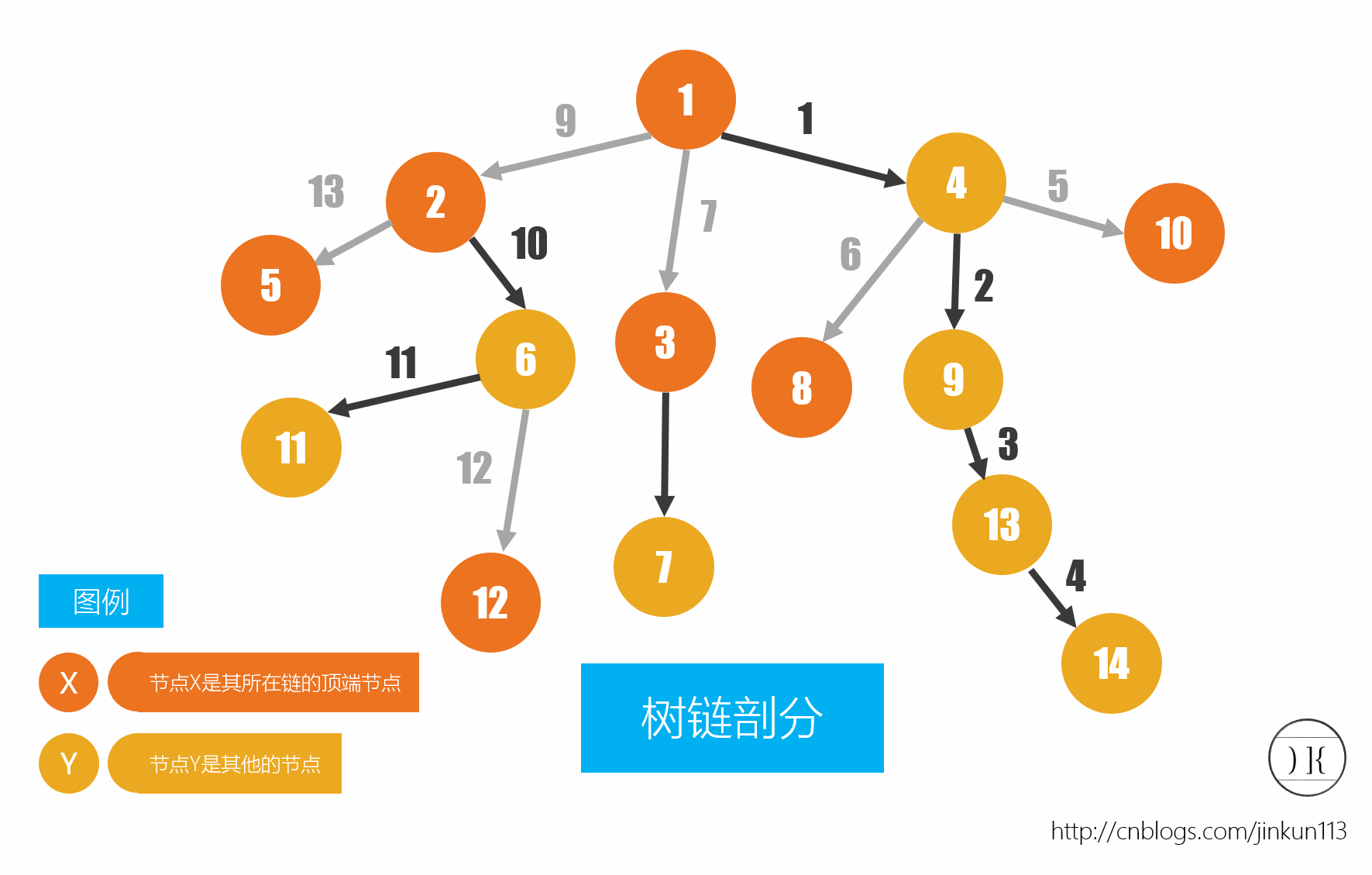2018年3月15日
树链剖分(轻重链剖分)原理与实现

概述
树链剖分是一种将树上的链划分为轻重链,从而实现降低复杂度的处理方式。剖分后的树,单次查询LCA的复杂度为O(\log n),与Tarjan-LCA算法与倍增算法复杂度相同,但是树剖可以在线,非常好用。
原理与实现
轻重链
我们把一个有根树一个点子树最大的儿子叫做这个点的重儿子,重儿子连接成的链为重链,而其他的链叫做轻链。每个点都有重儿子,因此重链可能并不连续。但是,可以证明一个点到根的路径上的链数为O(\log n)级别的。
下面是一棵剖分好了的树,图片来自[知识点]树链剖分 – jinkun113 – 博客园,感谢原作者。

如果我们每次从查询LCA的两个点上跳到他们所在的链顶,直到他们的链顶相同,就能够完成查询LCA的工作。
下面是树剖的两个DFS,用于处理子树信息与划分轻重链。
// 处理子树信息
void dfs1(int u) {
int mx = -1;
for(int i = head[u]; i != -1; i = gra[i].nxt) {
int v = gra[i].to;
if(v == fa[u]) continue;
dep[v] = dep[u] + 1;
fa[v] = u;
siz[u]++;
dfs1(v);
siz[u] += siz[v];
if(siz[v] > mx) {
mx = siz[v];
son[u] = v;
}
}
}
// 处理链信息
void dfs2(int u, int tp) {
top[u] = tp;
if(son[u] != 0) {
// 优先遍历重儿子
dfs2(son[u], tp);
}
for(int i = head[u]; i != -1; i = gra[i].nxt) {
int v = gra[i].to;
if(v == son[u] || v == fa[u]) continue;
dfs2(v, v);
}
}
查询LCA可以使用下面的实现。
int findlca(int u, int v) {
int f1 = top[u], f2 = top[v];
while(f1 != f2) {
if(dep[f1] > dep[f2]) {
std::swap(f1, f2);
std::swap(u, v);
}
v = fa[f2];
f2 = top[v];
}
if(dep[u] < dep[v]) return u; else return v;
}
DFS序
虽然划分了轻重链,但是只有这些信息我们也只能找个LCA。如果想维护链上信息,我们可以使用DFS序。在dfs2的时候把前序遍历的DFS序处理出来,连续的一段代表一个子树,而由于优先遍历重链,重链也是连续的一段。这样,我们就可以想办法套数据结构来统计链上信息了。
下面是统计DFS序版本的dfs2。
void dfs2(int u, int tp) {
top[u] = tp;
pos[u] = stn++;
if(son[u] != -1) {
dfs2(son[u], tp);
}
for(int e = head[u]; e != -1; e = gra[e].nxt) {
int v = gra[e].to;
if(v == son[u] || v == fa[u]) continue;
dfs2(v, v);
}
}
例题1:【P3379】【模板】最近公共祖先(LCA) – 洛谷
LCA在线查询,树剖疾如岛风哦~
// Code by KSkun, 2017/11
#include <cstdio>
#include <cstring>
#include <vector>
#include <algorithm>
struct io {
char buf[1 << 26], *s;
io() {
fread(s = buf, 1, 1 << 26, stdin);
}
inline int read() {
register int res = 0;
while(*s < '0' || *s > '9') s++;
while(*s >= '0' && *s <= '9') res = res * 10 + *s++ - '0';
return res;
}
} ip;
#define read ip.read
int n, m, s, x, y, a, b;
struct Edge {
int to, nxt;
} gra[1000005];
int head[500005], tot = 0;
inline void aedge(int u, int v) {
gra[tot].nxt = head[u];
gra[tot].to = v;
head[u] = tot++;
}
int dep[500005], siz[500005], son[500005], fa[500005], top[500005];
void dfs1(int u) {
int mx = -1;
for(int i = head[u]; i != -1; i = gra[i].nxt) {
int v = gra[i].to;
if(v == fa[u]) continue;
dep[v] = dep[u] + 1;
fa[v] = u;
siz[u]++;
dfs1(v);
siz[u] += siz[v];
if(siz[v] > mx) {
mx = siz[v];
son[u] = v;
}
}
}
void dfs2(int u, int tp) {
top[u] = tp;
if(son[u] != 0) {
dfs2(son[u], tp);
}
for(int i = head[u]; i != -1; i = gra[i].nxt) {
int v = gra[i].to;
if(v == son[u] || v == fa[u]) continue;
dfs2(v, v);
}
}
int findlca(int u, int v) {
int f1 = top[u], f2 = top[v];
while(f1 != f2) {
if(dep[f1] > dep[f2]) {
std::swap(f1, f2);
std::swap(u, v);
}
v = fa[f2];
f2 = top[v];
}
if(dep[u] < dep[v]) return u; else return v;
}
int main() {
memset(head, -1, sizeof head);
n = read(); m = read(); s = read();
for(int i = 0; i < n - 1; i++) {
x = read(); y = read();
aedge(x, y);
aedge(y, x);
}
dfs1(s);
dfs2(s, s);
for(int i = 0; i < m; i++) {
a = read(); b = read();
printf("%d\n", findlca(a, b));
}
return 0;
}
例题2:【P3384】【模板】树链剖分 – 洛谷
线段树维护链信息和子树信息w
// Code by KSkun, 2017/10
#include <cstdio>
#include <cctype>
#include <cstring>
typedef long long LL;
inline int read() {
register int res = 0;
register bool neg = false;
char c = '*';
while(!isdigit(c)) {
if(c == '-') neg = true;
c = getchar();
}
while(isdigit(c)) res *= 10, res += c - '0', c = getchar();
if(neg) res *= -1;
return res;
}
int n, m, r, p;
// Seg Tree
#define lch o << 1
#define rch (o << 1) | 1
#define mid ((l + r) >> 1)
LL a[100005], tree[400005], lazy[400005];
inline void build(int o, int l, int r) {
if(l == r) {
tree[o] = a[l];
return;
}
build(lch, l, mid);
build(rch, mid + 1, r);
tree[o] = tree[lch] + tree[rch];
}
inline void pushdown(int o, int l, int r) {
if(lazy[o] != 0) {
lazy[lch] += lazy[o];
lazy[rch] += lazy[o];
tree[lch] += lazy[o] * (mid - l + 1);
tree[rch] += lazy[o] * (r - mid);
lazy[o] = 0;
}
}
inline void add(int o, int l, int r, int ll, int rr, int v) {
if(l >= ll && r <= rr) {
tree[o] += v * (r - l + 1);
lazy[o] += v;
return;
}
pushdown(o, l, r);
if(ll <= mid) add(lch, l, mid, ll, rr, v);
if(rr > mid) add(rch, mid + 1, r, ll, rr, v);
tree[o] = tree[lch] + tree[rch];
}
inline LL query(int o, int l, int r, int ll, int rr) {
if(l >= ll && r <= rr) {
return tree[o];
}
pushdown(o, l, r);
LL sum = 0;
if(ll <= mid) sum += query(lch, l, mid, ll, rr);
if(rr > mid) sum += query(rch, mid + 1, r, ll, rr);
return sum;
}
// Poufen
struct Edge {
int to, nxt;
} gra[200005];
int head[100005], tot = 0;
inline void addedge(int u, int v) {
gra[tot].to = v;
gra[tot].nxt = head[u];
head[u] = tot++;
}
int dep[100005], siz[100005], son[100005], pos[100005],
fa[100005], top[100005], val[100005], stn = 1;
void dfs1(int u) {
int e = head[u], mx = -1;
while(e != -1) {
int v = gra[e].to;
if(v == fa[u]) {
e = gra[e].nxt;
continue;
}
dep[v] = dep[u] + 1;
fa[v] = u;
siz[u]++;
dfs1(v);
siz[u] += siz[v];
if(siz[v] > mx) {
son[u] = v;
mx = siz[v];
}
e = gra[e].nxt;
}
}
void dfs2(int u, int tp) {
top[u] = tp;
pos[u] = stn++;
if(son[u] != -1) {
dfs2(son[u], tp);
}
int e = head[u];
while(e != -1) {
int v = gra[e].to;
if(v == son[u] || v == fa[u]) {
e = gra[e].nxt;
continue;
}
dfs2(v, v);
e = gra[e].nxt;
}
}
inline void addpath(int x, int y, int val) {
int fx = top[x], fy = top[y];
while(fx != fy) {
if(dep[fx] >= dep[fy]) {
add(1, 1, n, pos[fx], pos[x], val);
x = fa[fx];
} else {
add(1, 1, n, pos[fy], pos[y], val);
y = fa[fy];
}
fx = top[x], fy = top[y];
}
if(pos[x] <= pos[y] || x == y) {
add(1, 1, n, pos[x], pos[y], val);
} else {
add(1, 1, n, pos[y], pos[x], val);
}
}
inline LL querypath(int x, int y) {
LL res = 0;
int fx = top[x], fy = top[y];
while(fx != fy) {
if(dep[fx] >= dep[fy]) {
res += query(1, 1, n, pos[fx], pos[x]);
x = fa[fx];
} else {
res += query(1, 1, n, pos[fy], pos[y]);
y = fa[fy];
}
fx = top[x], fy = top[y];
}
if(pos[x] <= pos[y] || x == y) {
res += query(1, 1, n, pos[x], pos[y]);
} else {
res += query(1, 1, n, pos[y], pos[x]);
}
return res;
}
inline void addsubt(int x, int v) {
add(1, 1, n, pos[x], pos[x] + siz[x], v);
}
inline LL querysubt(int x) {
return query(1, 1, n, pos[x], pos[x] + siz[x]);
}
int op, x, y, z;
int main() {
n = read(), m = read(), r = read(), p = read();
memset(head, -1, sizeof head);
memset(son, -1, sizeof son);
memset(fa, -1, sizeof fa);
for(int i = 1; i <= n; i++) {
val[i] = read();
}
for(int i = 0; i < n - 1; i++) {
x = read(), y = read();
addedge(x, y);
addedge(y, x);
}
dep[r] = 0;
fa[r] = r;
dfs1(r);
top[r] = r;
dfs2(r, r);
for(int i = 1; i <= n; i++) {
a[pos[i]] = val[i];
}
build(1, 1, n);
for(int i = 0; i < m; i++) {
op = read();
if(op == 1) {
x = read(), y = read(), z = read();
addpath(x, y, z);
} else if(op == 2) {
x = read(), y = read();
printf("%lld\n", querypath(x, y) % p);
} else if(op == 3) {
x = read(), z = read();
addsubt(x, z);
} else if(op == 4) {
x = read();
printf("%lld\n", querysubt(x) % p);
}
}
return 0;
}
